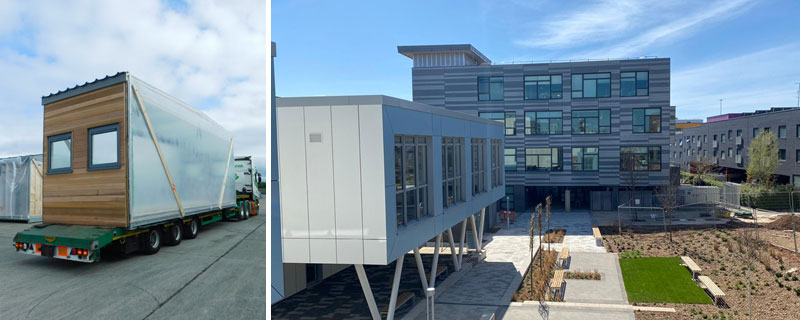Boho 8, the most recent phase of Middlesbrough’s Boho Zone, is the commercial quarter for the town’s digital media, digital technology and creative sectors located in Tees Valley.
Previously a car park, the £2.5million project, supported by the Local Growth Fund from the Tees Valley Mayor and Combined Authority, provides additional space for companies that are rapidly expanding elsewhere on the campus, and is intended to attract new digital and creative businesses to the area.
The award-winning concept by Seymour Architecture outlined high-quality facilities and a unique cantilevered design, with buildings ranging from 1,000 to 3,000ft². The buildings are complemented by a modern external communal space, with the aim of making it feel like a high street.
From concept to completion in just eight weeks
CPC worked closely with Middlesbrough Council and its partner Faithful+Gould through the Modular Buildings (MB1) framework, resulting in modular specialists M-AR being appointed to deliver the project.
The ambitious modular offices project began in August 2020, with construction of the buildings being manufactured at M-AR’s site on the banks of the River Humber in East Yorkshire while the groundworks were being carried out.
Just eight weeks later, four office blocks consisting of 18 individual 49m² modules had been completed and quality checked. They were erected over a five-day period.
Amanda Grimbleby, partnerships and business development director at M-AR, said:
“This just demonstrates the speed in which off-site construction can accelerate the delivery of such projects, and this has all been able to happen during the Covid-19 pandemic.
“The innovative design created by Seymour Architecture will provide light, bright and inspiring office spaces for ambitious and creative digital businesses in the region, and being part of making this happen is inspiring in itself.”
Collaboration is key
The working relationship between Middlesbrough Council, Faithful+Gould, M-AR and CPC contributed to the success of the project.
“It’s all about collaborative working and early engagement with the client and appointed company, to show what our Modular Buildings solution can achieve,” said Tony Maw, technical support manager at CPC.
“Our relationship provided a solid foundation in understanding how each other work, helping us to work in an effective manner to achieve the best quality results. I think Boho 8 is a great example what can be achieved by working side-by-side.”
Utilising procurement frameworks
Using frameworks for offsite projects allows relationships between clients and suppliers to develop and flourish over a longer-term period and sets out an integrated supply chain without any legal problems for procurement teams. Early engagement between suppliers and clients through the framework also ensures the risk load is shared more widely.
Mark Chicken, quantity surveyor at Faithful+Gould, said:
“CPC are very interactive, which is something you don’t get from most framework providers. This interaction gives you confidence in using their services, and you know there is always someone there to talk to for advice.”
The latest iteration of the framework, Modular Buildings (MB2), was launched in June 2021 and allows local authorities, social landlords and other public bodies to source preapproved specialist suppliers who can design, supply and install permanent, temporary, and refurbished modular buildings.
The MB2 framework can be used by local authorities across the UK through LHC’s regional hubs – LHC London and South East, SPA, WPA, SWPA and CPC – and will run until May 2025.
Offsite procurement frameworks
LHC has two additional frameworks that can support local authorities as they plan and implement offsite projects.
The Offsite Project Integrator (OPI1) framework can help to deliver an experienced and integrated supply chain. Launched last year to help authorities to find the technical support that can help with the planning and implementation of offsite housing schemes, the framework covers the preliminary stages prior to RIBA Stage 0 and then implementation to stage 7.
This framework sits alongside the Offsite Construction of New Homes (NH2) framework to offer solutions at every stage from design right through to occupation. It allows relationships between clients and suppliers to develop and flourish from the very early stages onwards and sets out an integrated supply chain without any legal problems for procurement teams. Early engagement between suppliers and clients through the framework will also ensure the risk load is shared more widely.
The Prior Information Notice for the third iteration of the Offsite Construction of New Homes (NH3) framework is live as of early February 2022. Companies can register interest in the NH3 framework and receive further updates by visiting LHC’s eTendering portal Proactis.





Leave a Reply
Want to join the discussion?Feel free to contribute!